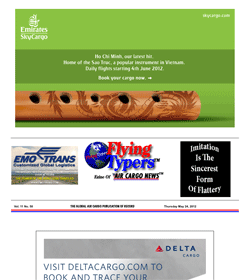 |
 |
|
| |
||
|
Vol. 11 No. 53 Monday June 4, 2012 |
| |
 |
“Being called back
home to lead the privatization of cargo has been quite an assignment,
made all the better by our increased business platform and movement
to new products and destinations.
“I can say without reservation that
the air cargo business today is quite dynamic and exciting.
“Air cargo is a community with people
that you deal with every day, including freight forwarders and others,
that tend to become friends for a long time.
“This is an aspect unique to air
cargo that I very much enjoy.
“Looking at a time table for our
move toward branding our product, it has commenced already with the
airline and very soon will continue as our name becomes Saudia Cargo.”
“Elsewhere we have made a few changes
in our approach to the market this year.
“Firstly, and in order to meet the
SkyTeam membership requirements, we are working hard on the full implementation
of e-freight and Cargo 2000.
“We are also developing our current
products as well as additional services, such as those based on the
Envirotainer concept.
“Finally, we are strengthening our
partnership with clients who deliver courier services by assisting them—not
only airside but also on the ground.
“Global cargo volumes were very
volatile in the first five months of 2012 due to the economic crisis
in Europe; volumes from the Far East remain soft.
“Air cargo continues to live up
to its reputation as a leading indicator of the global business situation.
“Hopefully we can see a positive
trend during the second half of the year.
“On the other hand, we have seen
strong growth in volumes to Africa and the Middle East, particularly
to Saudi Arabia and the UAE from Europe, the USA, and Asia.
“Most forecasts for the cargo industry
predict a flat market growth with pressure on rates due to over capacity.
“Looking at our own results, we
see a different picture.
“In the first 5 months we saw a
growth of 27 percent in our volumes.
“The major contributors to growth
were exports from Africa and Europe.
“We expect this growth trend to
continue throughout the year.
“The underpinnings of our success
and revitalization is the strength of our network, which is fast growing
and now includes 225 destinations with a fleet of 145 passenger aircraft
and 13 freighters.
“Also, the proximity of KSA connects
the emerging markets of Asia and Africa with the shortest possible routes.
“The air cargo business needs to
rationalize itself a bit, I think.
“For example, we shouldn’t
provide the market with a capacity more than it requires.
“Air cargo should endeavor to maintain
the balance between supply and demand and we need to adopt the latest
IT solutions that provide better service to our clients.
“Looking ahead to new frontiers,
we are looking to expand our network in South America and China, and
also modernize Saudia Cargo Fleet to improve our On Time Performance
(OTP).
“We are looking at both Airbus and
Boeing aircraft—the B777-200F and the B747-800F and the Airbus
330 as we advance toward fleet renewal and modernization.
“The environment is very much on
our mind as well.
“Saudia Cargo is leasing in freighters
that are modern and compliant with the emissions and noise regulations,
and we strive to further improve by leasing or purchasing the latest
modern freighter aircraft available.
“A major agenda item right now is
Saudia Cargo investing in new facilities at KSA with advanced systems
designed to handle all types of air cargo with the latest technologies,
but also in an environment based on sustainability.
“We are looking at energy-saving
lighting systems, free cooling when outdoor conditions permit, and Saudia
Cargo is investigating sun and wind energy and rainwater collection.
“We have also adopted security measures
and procedures to meet or exceed requirements of GACA and the different
National Civil Aviation Authorities of the countries to which we operate.
“This includes screening the cargo,
safe keeping it in a secured area, escorting cargo to and from the AC,
and guarding the aircraft at certain stations.
“On the other hand, access control
to the cargo terminal is enforced, certain passes are required to access
different areas of the terminal, frequent patrols to the facility are
performed, and the movement of people & equipment is monitored.
“We are also upgrading and implementing
paperless cargo, or eFreight, and call on all customs worldwide to accept
eFreight with one online global standard for all-customs clearance.
“A universal customs standard for
efreight in wide use could speed up air cargo by days and make our industry
more competitive.
“Looking ahead, we intend to leverage
every advantage, including our traditional strengths of location and
fleet and a growing network, with our highly competitive revitalized
outlook, including enhanced cargo terminals and a vastly improved customer
service delivery discipline to put our customers and a growing Saudia
Cargo up where it belongs.”
With its enviable location in the Middle
East, possession of the most advanced systems, and the finances and
strength to explore further green-technology adaptations and IT systems,
Saudia Cargo is positioned as one of the strongest cargo players in
the game.
Geoffrey/Flossie
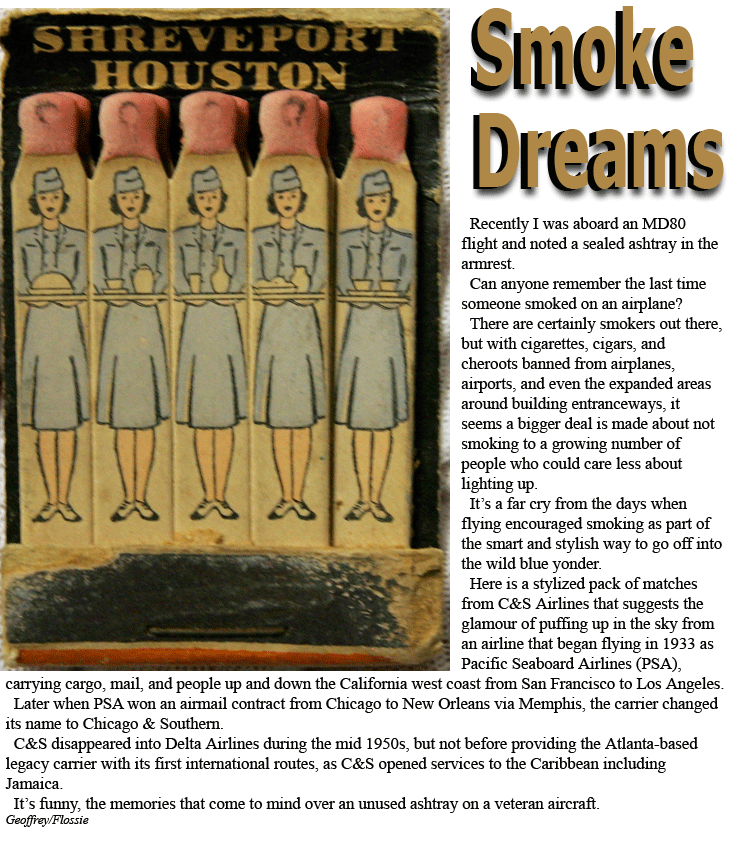 |
Get
On Board Air Cargo News FlyingTypers |
|


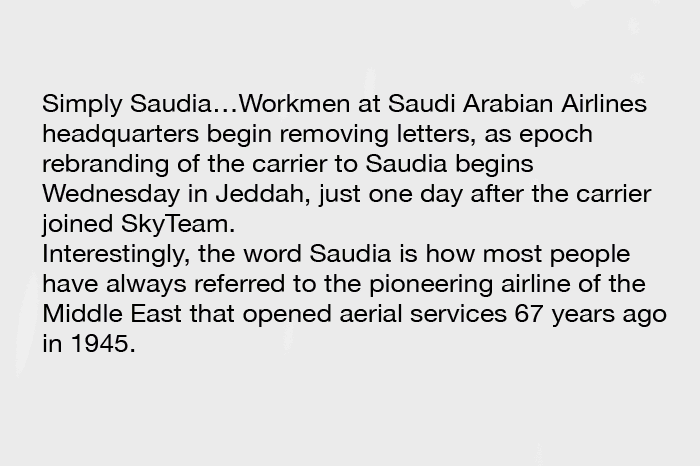

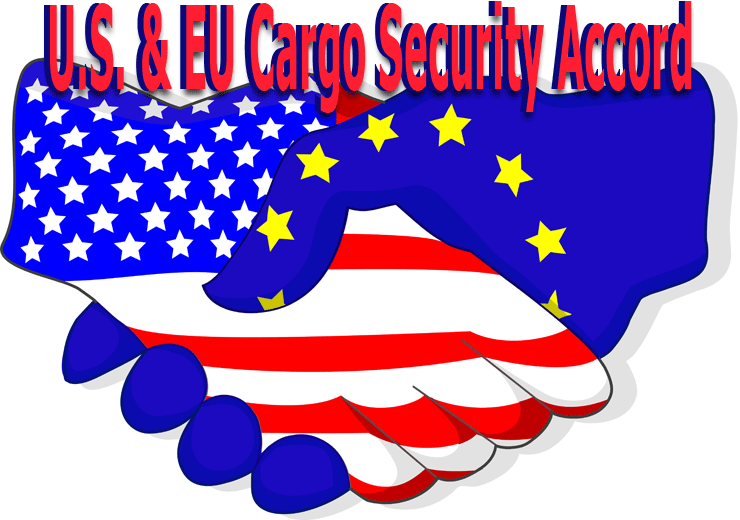
 As
expected, the United States and the European Union finalized a
deal last Friday to end wasteful air cargo security duplication
by ditching the crazy quilt of different rules and procedures
that have existed since 911.
As
expected, the United States and the European Union finalized a
deal last Friday to end wasteful air cargo security duplication
by ditching the crazy quilt of different rules and procedures
that have existed since 911. 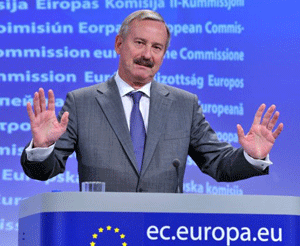 John S. Pistole, (above left) TSA
Administrator, is hopeful that at least air cargo can look forward
to some better security days ahead, with inspectors on both sides
of the Atlantic closer than ever to being on the same page.
John S. Pistole, (above left) TSA
Administrator, is hopeful that at least air cargo can look forward
to some better security days ahead, with inspectors on both sides
of the Atlantic closer than ever to being on the same page.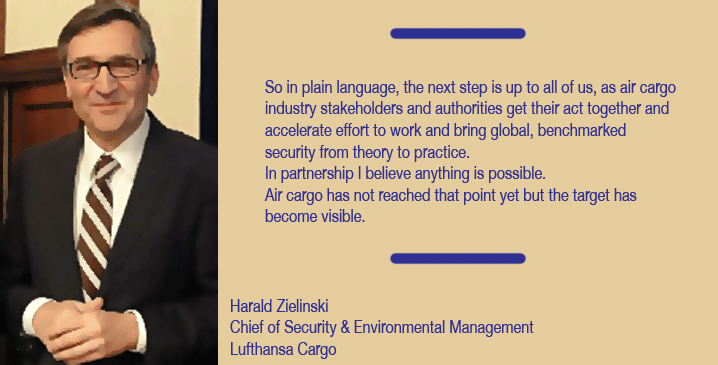
 Now a kinder, gentler TSA has finally
shown some common sense, as air cargo operators between EU and
USA can stop losing their shirts over needless procedural redundancies.
Now a kinder, gentler TSA has finally
shown some common sense, as air cargo operators between EU and
USA can stop losing their shirts over needless procedural redundancies.


 RE:
RE:
